GATE 2002
CE : CIVIL ENGINEERING
SECTION A (75 Marks)
CE-l. This question consists of TWENTY FIVE sub-questions (1.1 - 1.25) of ONE mark each. For each of these sub-questions four possible answers (A, B, C and D) are given, out of which ONLY ONE is correct. Answer each sub question by darkening the appropriate bubble on the OBJECTIVE RESPONSE SHEET (ORS) using a soft HB pencil. Do not use the ORS for any rough work. . You may use the Answer Book for any rough work, if needed.
1.1 Eigen values of the following matrix are:
![]()
(A) 3 and-5 (B) -3 and 5
(C) -3 and-5 (D) 3 and 5
1.2 The value of the following definite integral is:

(A) -2 In2
(B) 2
(C) 0
- The following function has a local minima at which value of x:
![]()
(a)
![]()
(b)
![]()
(c)
![]()
(d)
![]()
1.4 For the loading given in the figure below; two statements (I and II) are made.
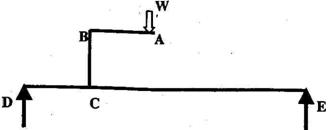
- Member AB carries shear force and bending moment
- Member BC carries axial load and shear force.
Which of the following is true:
- Statement I is true but II is false
- Statement I is false but II is true
- Both statements I and II are true
- Both statements I and II are false
1.5 Read the following two statements
I. Maximum strain in concrete at the outermost compression fibre is taken to be 0.0035 in bending.
II. The maximum compressive strain in concrete in axial compression is taken as 0.002.
Keeping the provisions of IS 456-2000 on limit state design in mind, which of the following is true:
- Statement I is true but II is false
- Statement I is false but II is true
- Both statements I and II are true
- Both statements I and II are false
1.6 As per the provisions of IS 456-2000, the (short term) modulus of elasticity of M25 grade concrete (in N/mm 2) can be assumed to be,
(a) 25000 (B) 28500 (C) 30000 (D) 36000
1.7 The shear modulus (G), modulus of elasticity (E) and the Poisson's ratio (v) of a material are related as,
- G=E/ [2(1+v)]
- E=G / [2(1+v)]
- G=E / [2(1-v)] �
- G=E / [2(v-1)]
- When designing steel structures, one must ensure that local buckling in webs does not take place. This check may not be very critical when using rolled steel sections because,
- Quality control at the time of manufacture of rolled sections is very good
- Web depths available are small
- Web stiffeners are in-built in rolled sections
- Depth to thickness ratios (of the web) are appropriately adjusted
1.9 An ISMB 500 is used as a beam in a multi-storey construction. From the viewpoint of structural design, it can be considered to be 'laterally restrained' when,
- the tension flange is 'laterally restrained'
- the compression flange is 'laterally restrained'
- the web is adequately stiffened
- the conditions in (A) and (C) are met.
1.10 Data from a sieve analysis conducted on a given sample of soil showed that 67% of the particles passed through 75 micron IS sieve. The liquid limit and plastic limit of the finer fraction was found to be 45 and 33 percents respectively. The group symbol of the given soil as per IS:1498-1970 is:
- SC (B) MI (C) CH (D) MH
1.11 The void ratios at the densest, loosest and the natural states of a sand deposit are 0.2, 0.6 and 0.4, respectively. The relative density of the deposit is:
- 100%
- 75%
- 50%
- 25%
1.12 The following data were obtained from a liquid limit test conducted on a soil sample.
| Number of blows | 17 | 22 | 25 | 28 | 34 |
| Water content (%) | 63.8 | 63.1 | 61.9 | 60.6 | 60.5 |
The liquid limit of the soil is:
(A) 63.1%
(B) 62.8%
(C) 61.9%
(D) 60.6%
1.13 The specific gravity and insitu void ratio of a soil deposit are 2.71 and 0.85 respectively. The value of the critical hydraulic gradient is:
- 0.82
- 0.85
- 0.95
- 0.92
1.14 The observed value of the standard penetration number (N) at 10m depth of a silty
sand deposit is 13. The unit weight of the soil is 16 kN/in 3.The N value after correcting for the presence of fines will be:
(A) 12
(B) 13
(C) 14
(D) 15
1.15 The force 'F' required at equilibrium on the semi-cylindrical gate shown below is:
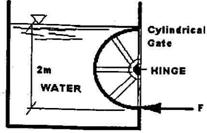
- 9.81 kN
- 0.0 kN
- 19.62 kN
- none of the above
1.16 Velocity distribution in a boundary layer flow over a plate is given by
(u/u m) = 1.5 h - 0.5 h 3 J
where, h = y/ d ; y is the distance measured normal to the plate; d is the boundary layer thickness; and U m is the maximum velocity at y = d . If the shear stress t , acting on the plate is given by
t =K( m u m)/ d
where, m is the dynamic viscosity of the fluid, K takes the value of:
- 0
- 1
(C) 1.5
(0) none of the above
l.l7 A 6-hour Unit Hydrograph (UH) of a catchment is triangular in shape with a total time base of 36 hours and a peak discharge of 18 m 3 /s. The area of the catchment (in sq. km) is:
- 233
- 117
- 1.2
- sufficient information not available
1.18 When there is an increase in the atmospheric pressure, the water level in a well penetrating in a confined aquifer:
- increases
- decreases
- may increase or decrease depending on the nature of the-1fquifer
- does not undergo any change
1.19 In a domestic wastewater sample, COD and BOD were measured. Generally which of the following statement is true for their relative magnitude?
- COD = BOD
- COD > BOD
- COD <BOD
- Nothing can be said
1.20 In disinfection, which of the following forms of chlorine is most effective in killing the pathogenic bacteria?
- Cr
- OCI
- NH 2CI
- HOCI
1.21 A Trickling filter is designed to remove:
- Settleable Solids
- Colloidal Solids
- Dissolved Organic Matter
- None of the above
1.22 In natural water, hardness is mainly caused by:
- Ca ++ and Mn ++
- Ca ++ and Fe ++
- Na + and K +
- Ca ++ and Mg ++
1.23 Bitumen is derived from:
- destructive distillation of coal tar
- destructive distillation of petroleum
- fractional distillation of petroleum
- naturally occurring ores
1.24 Dowel bars in concrete pavement are placed
- along the direction of traffic
- perpendicular to the direction of traffic
- along 45� to the direction of traffic
- can be placed along any direction
1.25 Stopping sight distance and frictional co-efficients are
- directly proportional to each other
- inversely proportional to each other
- unrelated
- either directly or inversely proportional to each other depending on the nature of pavement
CE-2. This question consists of TWENTY FIVE sub-questions (2.1 - 2.25) of TWO marks each. For each of these sub-questions four possible answers (A, B, C and D) are given, out of which ONLY ONE is correct. Answer each sub question by darkening the appropriate bubble on the OBJECTIVE RESPONSE SHEET (ORS) using a soft HB pencil. Do not use the ORS for any rough work. You may use the Answer Book for any rough work, if needed.
2.1 The value of the following improper integral is
![]()
- �
- 0
- -�
- 1
- The directional derivative of the following function at (1,2) in the direction of (4i+3j) is:
![]()
- 4/5
- 4
- 2/5
- 1
2.3 The Laplace Transform of the following function is
![]()
(A)
![]() for all s>0
for all s>0
(B)
![]() for all s < p
for all s < p
(c)
![]() for all s>0
for all s>0
(d)
![]() for all s >0
for all s >0
2.4 The limit of the following sequence as n � � is:
![]()
- 0
- 1
- �
- - �
�
2.5 A steel beam (with a constant El, and span L) is fixed at both ends and carries a uniformly distributed load (w kN/m), which is gradually increased till the beam reaches the stage of plastic collapse (refer to the following figure). Assuming 'B' to be at mid-span, which of the following is true,
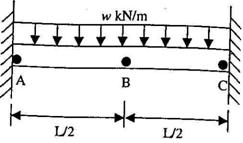
- Hinges are formed at A, B and C together
- Hinges are formed at B and then at A and C together
- Hinges are formed at A and C together and then at B
- Hinges are formed at A and C only
2.6 As per the provisions of IS 456-2000, in the limit state method for. design of beams, the limiting value of the depth of neutral axis in a reinforced concrete beam of effective depth 'd� given as: .
- 0.53d
- 0.48d
- 0.46d
- any of the, above depending on the different grades of steel
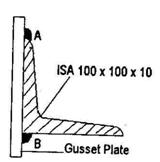 2.7 ISA 100 x 100 x 10 mm (Cross sectional area = 1908 mm 2) serves as
tensile member. This angle is welded to a gusset plate along A and B
appropriately as shown. Assuming the yield strength of the steel to be
260 N/ mm2 the tensile strength of this member can be taken to be
approximately,
2.7 ISA 100 x 100 x 10 mm (Cross sectional area = 1908 mm 2) serves as
tensile member. This angle is welded to a gusset plate along A and B
appropriately as shown. Assuming the yield strength of the steel to be
260 N/ mm2 the tensile strength of this member can be taken to be
approximately,
(A) 500 kN
(B) 300 kN
(C) 225 kN
(D) 375 kN
2.8 ISA 100 x 100 x 10 mm (Cross sectional area = 1908 mm 2) is welded along A and B (Refer to figure for question 2.7), such that the lengths of the weld along A and B are 1 1 and 1 2, respectively. Which of the following is a possibly acceptable combination of 1 1 and 1 2.
(A) 1 1 = 60 mm and 1 2 = 150 mm
(B) 1 1= 150 mm and 1 2 = 60 mm
(C) 1 1 = 150 mm and 1 2 = 150 mm
(D) Any of the above, depending on the size of the weld.
2.9 In the propped cantilever beam carrying a uniformly distributed load of w N/m, shown in the following Figure, the reaction at the support B is
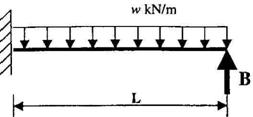
(A)
![]()
(B)
![]()
(C)
![]()
(D)
![]()
2.10 An infinite slope is to be constructed in a soil. The effective stress strength parameters of the soil are c�=O and f '= 30�. The saturated unit weight of the slope is 20 kN/m 3 and the unit weight of water is 10 kN/m 3. Assuming that seepage is occurring parallel to the slope, the maximum slope angle for a factor of safety of 1.5 would be:
(A) 10.89�
(B) 11.30�
- 12.48�
- 14.73'�
2.11 If the effective stress strength parameters of a soil are c'=10 kPa and 0'=30�, the shear strength on a plane within the saturated soil mass at a point where the total normal stress is 300 kPa and pore water pressure is 150 kPa will be:
- 90.5 kPa
- 96.6 kPa
- 101.5 kPa
- 1O5.5.kPa
2.12 The time for a clay layer to achieve 85% consolidation is 10 years. If the layer was half as thick, 10 times more permeable and 4 times more compressible then the time that would be required to achieve the same degree of consolidation is:
- 1 year
- 5 years
- 12 years
- 16 years
2.13 In a triaxial test carried out on a cohesion less soil sample with a cell pressure of
20 kPa, the observed value of applied stress at the point of failure was 40 kPa. The angle of internal friction of the soil is:
- 10�
- 15�
- 25�
- 30�
2.14 In a falling head permeability test the initial head of 1.0 m dropped to 0.35 m in 3 hours, the diameter of the stand pipe being 5 mm. The soil specimen was 200 mm long and of 100 mm diameter. The coefficient of permeability of the soil is:
- 4.86 x 10 -5 cm/s
- 4.86 X 10 -6 cm/s
- 4.86 x 10 -7 cm/s
- 4.86 x 10 -8 cm/s
2.15 In a lined rectangular canal, the Froude number of incoming flow is 3.0. A hydraulic jump forms when it meets the pool of water. The depth of flow. after the jump formation is 1.51 m. Froude number of flow after the hydraulic jump is:
- 0.30
- 0.71
- 0.41
- none of the above
2.16 A pump can lift water at a discharge of 0.15 m 3/s to a head of 25 m. The critical cavitation number ( s c ) for the pump is found to be 0.144. The pump is to be installed at a location where the barometric pressure is 9.8 m of water and the vapour pressure of water is 0.30 m of water. The intake pipe friction loss is 0.40 m. Using the minimum value of NPSH (Net Positive Suction Head), the maximum allowable elevation above the sump water surface at which the pump can be located is:
(A) 9.80 m
(B) 6.20 m
(C) 5.50 m
(D) none of the above
2.17 During a 6- hour storm, the rainfall intensity was 0.8 cm/hour on a catchment of area 8.6 km 2. The measured runoff volume during this period was 2,56,000 m 3. The total rainfall was lost due to infiltration, evaporation, and transpiration (in cm/hour) is
- 0.80
- 0.304
- 0.496.
- sufficient il1fonnation not available
2.18 The rainfall on five successive days in a catchment were measured as 3, 8, 12,6, and 2 cms. If the total runoff at the outlet from the catchment was 15 cm, ,the value of the f -index (in mm/hour) is
- 0.0
- 1.04
- 1.53
- sufficient information not available
2.19 A canal was designed to supply the irrigation needs of 1200 hectares of land growing rice of 140 days base period having a Delta of 134 cms. If this canal water is used to irrigate wheat of base period 120 days having a Delta of 52 cm, the area (in Hectares) that can be irrigated is:
(A) 2650
(B) 3608
(C) 543
(D) none of the above
2.20 For a water treatment plant having a flow rate of 432 m 3/hr, what is the required
plan area of a Type I settling tank to remove 90% of the particles having a settling velocity of 0.12 cm/sec is
(A) 120 m 2
(B) 111 m 2
(C) 90 m 2
(D) 100 m 2
2.21 The theoretical oxygen demand of a 0.001 mol/L glucose solution is
(A) 180 mg/L
(B) 192 mg/L
(C) 90 mg/L
(D) 96 mg/L
2.22 waste water sample has an initial BOD of 222 mg/L. The first order BOD decay coefficient is 0.4/day. The BOD consumed (in mg/L) in 5 'days is:
- 150
- 192
- 30
- 50
2.23 car is moving at a speed of 72 km/hr on a road having 2% upward gradient. The driver applies brakes when he sees an obstruction. If his reaction time is 1.5 seconds, assuming that the co-efficient of friction between the pavement and tire as 0.15, calculate the distance traversed before the car finally stops.
- 24 m
- 150 m
- 1056 m
- 324 m
2.24 The average daily traffic on a stretch of road is 300 commercial vehicles per lane per day. Design traffic repetitions for 10 years when vehicle damage factor is 2,5 and traffic growth rate is 7%, is .
- 3.8 msa
- 23.5 msa
- 45.4 msa
- 16 msa
2.25 In a concrete pavement
- temperature stress is tensile at bottom during day time
- load stress is compressive at bottom
(A) Both the statements (a) and (b) are correct
(B) Statement (a) is correct and (b) is wrong.
(C) Statement (b) is wrong and (a) is correct
(D) Both statements (a) and (b) are incorrect






